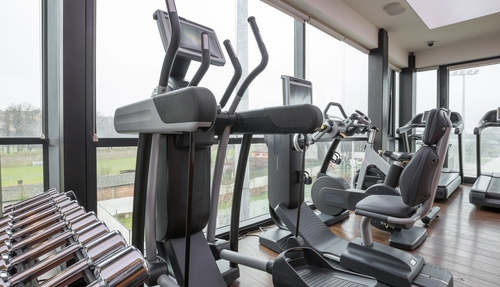By Kevin Calcagnie on October 29, 2015 -

Pouzbaris v. Prime Healthcare Services—Anaheim, LLP (Fourth District, April 23, 2015) 236 Cal.App.4th 116, 186 Cal.Rptr.3d 314, 15 Cal. Daily Op. Serv. 3973, 2015 Daily Journal D.A.R. 4512
A woman who was injured when she slipped and fell on a recently mopped floor at a hospital filed suit against the owner of the facility, seeking damages under a theory of premises liability. The plaintiff alleged that she had been admitted to the hospital after complaining of chest tightness with shortness of breath, and that she had fallen during her stay while returning to her bed from the bathroom.
The defendant moved for summary judgment, arguing that plaintiff’s action, which was filed nearly two years after the accident, was time-barred by Code of Civil Procedure section 340.5, which provides that in an action for injury or death against a health care provider based upon such person’s alleged professional negligence, the time for the commencement of action is the earlier of three years after the date of injury or one year after the plaintiff discovers, or through the use of reasonable diligence should have discovered, the injury. The plaintiff opposed the motion arguing that the action was outside of MICRA, and subject to the two-year statute of section 335.1, pertaining to ordinary negligence claims for personal injury.
The trial court granted the motion, ruling that the action was one for professional negligence because the negligence was “committed in the act of rendering services for which the hospital is licensed,” which was namely “to use reasonable care and diligence in safeguarding a patient committed to its charge. However, the court of appeal reversed, relying in part on Bellamy v. Appellate Department (1996) 50 Cal.App.4th 797 and Murillo v. Good Samaritan Hospital (1979) 99 Cal.App.3d 50: Read the rest »
By Kevin Calcagnie on October 26, 2015 -

Rosas v. BASF Corporation (Second District, May 21, 2015) — Cal.Rptr.3d —-, 15 Cal. Daily Op. Serv. 5042, 2015 Daily Journal D.A.R. 5570
A worker at a food flavoring plant filed an action against several manufacturers of diacetyl, a chemical used in food manufacturing. The plaintiff alleged that as a result of his workplace exposure to the chemical he developed a severe lung disease known as bronchiolitis obliterans. The defendants moved for summary judgment, contending that the two-year statute of limitations had run on the plaintiff’s claim, because even though he had been experiencing symptoms since as early as 2000, and had shared his suspicions with his doctors in 2003 that his exposure to diacetyl had been making him sick, he did not file suit until October of 2008.
The plaintiff opposed the motion on the basis of delayed discovery, arguing that until November of 2006 when his condition was diagnosed as having been caused by diacetyl, he was unaware of the cause of his injury. The plaintiff also contended that because of his physicians’ earlier inability to determine the cause, he was under no duty to further investigate. The trial court granted summary judgment, but the court of appeal reversed, finding that the evidence could support a legitimate inference that a reasonable person in the plaintiff’s situation would not have suspected a wrongful cause for his lung disease: Read the rest »
By Kevin Calcagnie on September 17, 2015 -
 Grebing v 24 Hour Fitness USA, Inc. (2nd Dist., January 29, 2105) 234 Cal.App.4th 631, 184 Cal.Rptr.3d 155.
Grebing v 24 Hour Fitness USA, Inc. (2nd Dist., January 29, 2105) 234 Cal.App.4th 631, 184 Cal.Rptr.3d 155.
A health club member who was injured while using exercise equipment known as a “low row machine” filed suit against the facility, asserting various theories of negligence and products liability. The plaintiff alleged that a connecting clip broke while he was pulling a handlebar connected to a cable running through pulleys and attached to weights, causing the handlebar to strike him in the forehead.
The defendant moved for summary judgment, arguing that the plaintiff had signed a release of liability assuming the risk of injury, which included the language: “Further, you understand and acknowledge that 24 Hour does not manufacture fitness or other equipment at its facilities, but purchases and/or leases equipment. You understand that 24 Hour is providing recreational services and may not be held liable for defective products.” The plaintiff opposed the motion, arguing that the defendant was in the chain of distribution and did not merely provide fitness services.
The trial court granted summary judgment and the court of appeal affirmed, holding that although products liability claims cannot be waived, the dominant purpose of the agreement was for services and not for provision of a product: Read the rest »
By Kevin Calcagnie on September 11, 2015 -

Fazio v. Fairbanks Ranch Country Club, — Cal.Rptr.3d —-, 2015 WL 367100
A professional musician who was injured when he fell from a stage while setting up equipment for his bass guitar prior to a performance, filed suit against the property owner. The plaintiff alleged that the defendant was negligent, and that the premises were in a defective and dangerous condition, in that the configuration of the stage had significant gaps at the sides creating an unreasonable risk of harm. The defendant moved for summary judgment, arguing that it owed no duty to the plaintiff to configure the stage in any particular way, and because the plaintiff assumed the risk of his injuries.
The trial court granted summary judgment, finding that the doctrine of primary assumption of the risk barred the claim, and rejecting the plaintiff’s contention that the gaps at the side of the stage increased the risk of falling. However, the court of appeal reversed, holding that the defendant had not met its initial burden of proof, and that even if it had, disputed issues of material fact remained concerning whether the defendant breached its duty not to increase the inherent risks: Read the rest »
By Kevin Calcagnie on August 27, 2015 -

Velasquez v. Centrome, Inc., — Cal.Rptr.3d —-, 2015 WL 400543
An undocumented immigrant who developed a progressive lung disease while working at a manufacturing facility, filed suit against a supplier of various chemical compounds to which he was exposed on his employer’s premises. Asserting various products liability theories, the plaintiff contended that the products were defective and that the defendant had violated regulations governing mandatory hazardous materials warnings.
Prior to trial the plaintiff filed a motion in limine to preclude any evidence or comment about his immigration status. Following a 402 hearing in which the plaintiff’s expert testified that if the plaintiff were in the country illegally and subject to deportation, it would have an impact on his ability to obtain a transplant, the trial court denied the motion, and informed prospective jurors of the plaintiff’s undocumented status.
When experts testified at trial that new policies would prevent the plaintiff’s immigration status from affecting his ability to receive a transplant, the court ruled that the plaintiff’s immigration status was irrelevant, but denied the plaintiff’s motion for a mistrial. Following a defense verdict the plaintiff appealed, contending that the trial court erred when it denied the motion for mistrial after the evidence showed the irrelevance of his immigration status. The appellate court agreed and reversed: Read the rest »
By Kevin Calcagnie on July 13, 2015 -
McIntyre v. Colonies-Pacific, LLC, (Fourth District, July 31, 2014) 228 Cal.App.4th 664, 175 Cal.Rptr.3d 440, 14 Cal. Daily Op. Serv. 8687, 2014 Daily Journal D.A.R. 10,125
A jewelry store owner who was held up at gunpoint by robbers and severely pistol whipped, filed suit against the owners of the shopping center in which his store was located, asserting negligence and premises liability theories. The plaintiff alleged that prior to the incident two stores had been robbed at gunpoint and that several times prior to the incident he had expressed concern about the lack of security to an employee of the defendant. He also alleged that when the defendant hired an unarmed guard to patrol the common areas following the subject incident, there were no more armed robberies over a period of five years.
Prior to trial the defendant moved to exclude any evidence of subsequent remedial measures under Evidence Code section 1151, including the hiring of the security service. The plaintiff opposed the motion, arguing that the evidence was not being offered to show a breach of care, but rather, to show the lack of a security patrol was the cause of the accident. The trial court granted the motion, and excluded the evidence. The jury found the defendant was negligent, but that its negligence was not a substantial factor in the plaintiff’s damages. The court of appeal affirmed, holding that the trial court had not abused its discretion in excluding the evidence, and rejecting the plaintiff’s argument that the defendant’s had opened the door to its admission during opening statement: Read the rest »
By Kevin Calcagnie on May 11, 2015 -
Verdugo v. Target Corp., (Supreme Court of California, June 23, 2014) — P.3d —-, 59 Cal.4th 312, — P.3d —-, 2014 Daily Journal D.A.R. 8060
The heirs of a 49-year-old woman who died after suffering sudden cardiac arrest while shopping at a Target department store filed a wrongful death action against Target Corp., contending that the defendant breached the duty of care that it owed to the decedent by failing to have on hand an automated (or automatic) external defibrillator (AED) for use in a medical emergency. The plaintiffs alleged that it took the paramedics several minutes to reach the store and a few additional minutes to reach the victim inside the store, and that the paramedics attempted to revive her but were unable to do so.
The Plaintiffs alleged that an AED was an essential element of the life-saving first aid that Target was obligated to provide to its patrons, in view of the large number of persons (300,000) in the U.S. who suffer an unanticipated sudden cardiac arrest each year, and the large number of customers who shop in Target’s department stores. They further alleged that it was reasonably foreseeable that a patron might suffer such an attack in its store, and that because of the size of the store Target should have known that it would take emergency medical personnel many minutes to reach a sudden cardiac arrest victim, making an onsite AED a medical necessity.
The federal district court granted Target’s motion, concluding that Target had no duty to acquire and make available an AED for the use of its customers. The Ninth Circuit Court of Appeals certified the question to the California Supreme Court, which concluded that under California law, Target’s common law duty of care to its customers does not include a duty to acquire and make available an AED for use in a medical emergency: Read the rest »
By Kevin Calcagnie on February 25, 2015 -
Johnson v. Prasad, (Third District, February 25, 2014 | 224 Cal.App.4th 74, 168 Cal.Rptr.3d 196, 14 Cal. Daily Op. Serv. 2064, 2014 Daily Journal D.A.R. 2325
The mother of a four-year-old boy who drowned in the swimming pool of a rented house filed an action for wrongful death against the homeowners. The plaintiff alleged that the child, who had accompanied his father and grandmother to a get-together at the home, had wandered into the pool area when no one was present and had fallen in unseen when his grandmother had returned to the house and failed to close a security gate or the sliding glass door behind her. The plaintiffs further alleged that the homeowners were negligent in failing to install a fence around the perimeter of the pool or a self-closing or self-latching mechanism on the only door leading from the house to the pool.
The trial court granted summary judgment, finding that the defendants had no duty to inspect the premises, in that there was no reason to expect children to be playing in the pool, the pool was not a ‘nuisance’ or an unreasonably dangerous condition of property. The court also found that there was no evidence that it was more likely than not that the conduct of the homeowners was a cause in fact of the drowning, because the security gate and sliding glass door could not have been involved in this accident, since they were left open on purpose.
However, the court of appeal reversed, holding as a matter of law that the homeowners, who knowingly rented a home with a maintained pool, owed a duty of reasonable care to the four-year-old boy to protect him from drowning in the pool:
Read the rest »
By Kevin Calcagnie on March 25, 2014 -
Flores v. Presbyterian Intercommunity Hospital (2013) 213 Cal.App.4th 1386, 153 Cal.Rptr.3d 413
A hospital patient who suffered injuries to her left knee and elbow when her bed rail collapsed, causing her to fall to the floor, filed suit against the hospital for general negligence and premises liability. The plaintiff contended that the action was not based upon professional negligence, in that no negligence was committed in assessing the condition of Plaintiff and in failing to raise the bed’s siderails. The plaintiff also alleged that it was only after the rendition of all professional services and after the siderails had been negligently latched, that the rail collapsed.
The hospital demurred to the complaint, arguing that the action was barred by C.C.P. § 340.5, the one year statute of limitations for professional negligence actions against health care providers. The trial court sustained the demurrer without leave to amend, reasoning that ensuring bedrails are properly raised, lowered or latched is a duty that arises from professional services. However, the court of appeal reversed, holding that the facts as alleged sounded in ordinary negligence which did not occur in the rendering of professional services, and that the case was therefore subject to the two year statute of limitations: Read the rest »
By Kevin Calcagnie on February 15, 2012 -
Lewis Operating Corporation v. Superior Court, (Fourth District, November 10, 2011) 132 Cal.Tprt.3d 849, 11 Cal. Daily Op. Serv. 13,810, 2011 Daily Journal D.A.R. 16,468
An apartment resident who was injured while using a treadmill at a ‘tenant-only’ health club/exercise facility filed an action for personal injuries against his landlord and a personal training company. The plaintiff alleged that an employee of the latter had rolled a ball into the treadmill, causing it to flip upward and throw the plaintiff off of the machine.
The defendants moved for summary judgment based upon a ‘release and waiver’ provision in the rental agreement under which tenants assumed all risks of harm arising from use of the health and recreation facilities. The trial court denied the motion, finding that the agreement was unenforceable under Civil Code § 1953, which declares void any provision of a dwelling lease or rental agreement which modifies or waives the tenant or leasee’s right to have the landlord exercise due care to prevent personal injury where that duty is imposed by law. However, the court of appeal issued a peremptory writ of mandate directing the trial court to grant the motion, holding that a landlord’s duty to maintain amenities does not necessarily trigger the application of § 1953:
Read the rest »
 RSS
RSS




 Los Angeles
Los Angeles